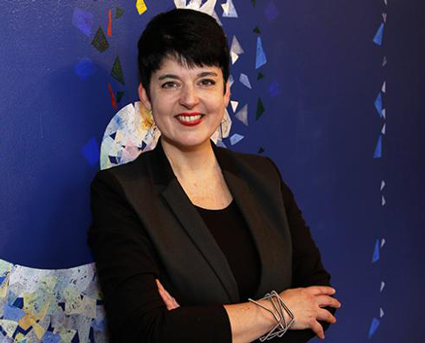[ad_1]

Deborah Cullen.
JOHN PINDERHUGHES
The Bronx Museum of the Arts has tapped Deborah Cullen to be its new director. Cullen will start in her post in July.
Cullen has been the director and chief curator of the Wallach Art Gallery at Columbia University in New York since 2012. Her main charge in the position was overseeing the migration of the Wallach to Columbia’s new Manhattanville campus in the Lenfest Center for the Arts on West 129th Street. Prior to her time at the Wallach, Cullen worked at El Museo del Barrio for over 15 years, ultimately rising to the post of director of curatorial programs.
“[Cullen] is recognized for actively engaging with the communities in which she works, for fostering established and emerging living artists, for her strong focus on African-American, Caribbean, and Latinx art, and for her expertise in these areas,” Bronx Museum board chair Joseph Mizzi said in a statement.
Cullen takes over a directorship that has been vacant since the untimely death of Holly Block in October 2017. Block’s achievements during her tenure included the decision to stop charging admission in 2012, which quadrupled the museum’s attendance; organizing the 2013 U.S. pavilion at the Venice Biennale with work by Sarah Sze; and starting a $25 million campaign to expand the museum’s building, $7 million of which had been raised by the time she died.
Cullen said she had no plans to announce a specific vision for the future of the museum just yet, noting that much of its exhibition calendar is already set, and for the moment she will “think through together with the board and the staff what the next steps will be, and doing what we’re doing bigger and better, locally and beyond.”
Cullen’s first exhibition in the new Wallach space was the inaugural edition of an ambitious new triennial called “Uptown” that looked to highlight the artistic practices of artists living or working north of 99th Street in Manhattan, an area typically overlooked by New York’s mainstream art world. The “Uptown” triennial included a main show at the Wallach as well as sections at 13 partner institutions throughout Upper Manhattan.
At the time, Cullen told ARTnews, “It’s a no-brainer, really, to have a format, a regular mechanism for the gallery to work with the boarder community. . . . Our neighbors, the local community should be our first audience.”
This mode of collaboration and championing the local community is one of Cullen’s hallmarks as a curator and museum director, something she sees as “fundamental” to the role of a museum. “There’s strength in collaboration,” Cullen told ARTnews in an interview. “It leverages the work that we’re doing and it’s important to learn from our colleagues in the field to expand that work.”
At El Museo, she organized four editions of the museum’s own biennial, La Bienal, which showed work by emerging and under-recognized Latinx artists. She has long been an advocate for the work of Latinx and Latin American artists in the greater discourse, particularly the work of artists from the Caribbean. Cullen also recently traveled the exhibition “Relational Undercurrents: Contemporary Art of the Caribbean Archipelago,” which opened earlier this month, to the Wallach from the Museum of Latin American Art in Long Beach, California, where it was part of the Getty Foundation’s Pacific Standard Time: LA/LA initiative. (The second half of that exhibition opens on June 28 at the Sugar Hill Children’s Museum of Art and Storytelling.)
“Deborah Cullen’s appointment is the best thing to happen to the Bronx,” Alicia Grullon, an artist based in the borough, told ARTnews. “From my work with her at El Museo del Barrio and the Wallach Art Gallery at Columbia University, every aspect of it was handled with integrity and real deep listening to community concerns followed by action. With so many changes and challenges affecting local communities of color, such as displacement, and arts institutions at times [being] complicit, leaders like her will ask tables to turn for the people.”
In regards to the Bronx Museum’s relationship to the local community, Cullen noted that the museum has longstanding and ongoing partnerships with local schools that she sees as quintessential of the museum’s programming and an area she would like to see expand even further. “Access to the arts is so important today, and the Bronx Museum is poised to be providing that access,” Cullen said.
[ad_2]
Source link

